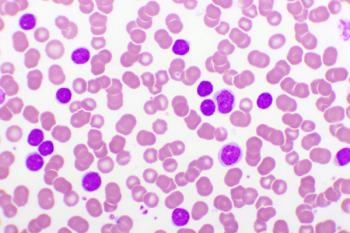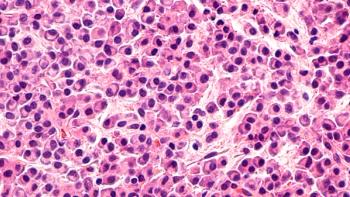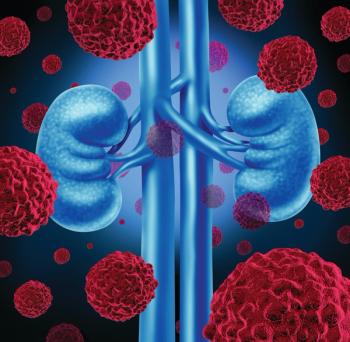Articles by Hannah Slater

“Our results suggest that low [intertumoral heterogeneity] is associated with increased response to anti–PD-1 immunotherapy in renal cell carcinoma through increased immune activity involving more neoantigens and less frequent immune evasion,” wrote the study authors, led by Xia Ran.

The ongoing phase 3 CASPIAN trial evaluating the use of intravenous durvalumab, with or without tremelimumab, added to platinum–etoposide for the first-line treatment of extensive-stage small cell lung cancer demonstrated improved overall survival versus chemotherapy alone.

Bristol Myers Squibb announced that nivolumab has been granted priority review for indications in both the first-line and adjuvant treatment settings as therapy for gastrointestinal cancers.

The assistant professor of Urology at The University of Texas MD Anderson Cancer Center spoke about the results of a study which evaluated the use of the Mediterranean diet in men with localized prostate cancer on active surveillance.

Based on recent study results, investigators recommended TBI plus etoposide for patients older than 4 years of age with high-risk ALL undergoing allogeneic hematopoietic stem cell transplantation.

The approval was based on results from the phase 2 DESTINY-Gastric01 trial which evaluated patients with HER2-positive locally advanced or metastatic gastric or GEJ adenocarcinoma who had progressed on at least 2 prior regimens.

The phase 2 study presented at the 2021 American Society of Clinical Oncology (ASCO) Gastrointestinal Cancer Symposium reported a total of 2 responses at the interim analysis, meeting criteria to continue accrual.

SWOG S1406 evaluated the use of irinotecan and cetuximab (Erbitux) with or without vemurafenib (Zelboraf) in patients with BRAF V600E-mutated metastatic colorectal cancer who had been previously treated with 1 or 2 regimens.

A study found that patients without recurrence of their oropharyngeal cancer at 5 years who were treated with intensity-modulated radiation therapy and had less tobacco exposure experienced optimal survival, but still had poorer outcomes when compared with the general population.

The study assessed the use of irinotecan and cetuximab (Erbitux) with or without vemurafenib (Zelboraf) in patients with BRAF V600E–mutated metastatic CRC who had been previously treated with 1 or 2 regimens.

“Based on the results of the QUAZAR study, it is very exciting to think that, by taking a tablet that is relatively well tolerated, we can help reduce relapse risk and improve survival,” lead study author Andrew H. Wei, MB, BS, PhD, said in a press release.

Though the majority of immune-related adverse events (irAEs) can be managed with corticosteroids and other immunosuppressive treatments, life-threatening and sometimes fatal events have still been reported thus revealing a need to develop measures for effective management.

A group launched by the Global Health Research Unit of the National Institute for Health Research, which is currently seeking to determine the best surgical practices for cancer treatments, found that there is no additional risk of contracting COVID-19 for patients with cancer of the head and neck.

A study of simulated patients with primary epithelial ovarian cancer found that none of the maintenance therapy regimens evaluated were cost-effective when compared with observation following frontline response.

“These findings highlight the dynamic interplay between both providers and their patients as well as between the latter’s [health literacy] and [shared decision making] that should inform the creation and promulgation of [shared decision making] guidelines, specifically when considering patients with low [health literacy],” wrote David-Dan Nguyen, MPH, and colleagues.

“As the number of AYA survivors continues to grow, there is a pressing need for targeted information, education, and intervention around sexual health, intimate relationships, and body image,” the Children’s Oncology Group (COG) AYA Oncology Discipline Committee wrote in a review.

The phase 3 ARIEL4 trial is evaluating rucaparib (Rubraca) versus chemotherapy in patients with platinum-sensitive, partially platinum-sensitive, and platinum-resistant relapsed ovarian cancer and a BRCA mutation who have received 2 or more prior lines of chemotherapy.

An expert in multiple myeloma spoke about the most exciting research to come out of 2020 and what research he hopes to see in 2021.

In addition to a concerning trend of increased rates of esophageal adenocarcinoma noted over the last 4 decades, this study also found that the proportion of those with advanced disease at presentation continues to rise for patients younger than age 50.

The combination of tiragolumab and atezolizumab (Tecentriq) was granted breakthrough therapy designation based on promising efficacy and safety data observed in the phase 2 CITYSCAPE trial.

Nivolumab was previously granted accelerated approval by the FDA for the treatment of patients with small cell lung cancer (SCLC) whose disease had progressed after platinum-based chemotherapy and at least 1 other line of therapy, but phase 3 trial results led to a decision to withdraw the indication.

Combination treatment with telaglenastat (CB-839) and cabozantinib (Cabometyx) did not meet the study’s primary end point of improved progression-free survival versus cabozantinib alone in patients with advanced or metastatic clear cell renal cell carcinoma.

Under the FDA’s Real-Time Oncology Review Pilot Program and Project ORBIS, the FDA is reviewing a supplemental new drug application for lorlatinib (Lorbrena) as a first-line treatment for patients with ALK-positive metastatic non–small cell lung cancer.

The breast cancer expert discussed the latest developments in breast cancer research and what she hopes the next year will offer this patient population.

Treatment with olaparib versus physician’s choice of standard therapy led to a significantly longer duration of overall survival in patients with metastatic castration-resistant prostate cancer who had tumors with at least 1 alteration in BRCA1/2 or ATM and whose disease had progressed during previous treatment with a next-generation hormonal agent.

Among women with early-stage triple-negative breast cancer who received standard adjuvant treatment, low-dose capecitabine maintenance therapy for 1 year resulted in significantly improved disease-free survival rates compared with observation.

Study results indicated that the small molecule HIF-2α inhibitor MK-6482 induced positive results in patients with certain Von Hippel-Lindau disease–associated solid tumors.

“Although previous trials demonstrated that the prior version of the DNA-RNA test was more specific than the prior version of the RNA test, the current molecular test techniques have no statistically significant difference in performance,” wrote Masha J. Livhits, MD, and colleagues.

The medical oncologist at the Mayo Clinic in Phoenix, spoke about the progress seen in gastrointestinal cancer research in 2020, as well as what improvements he hopes will occur in 2021.

The results of one study suggested that older adults with advanced cancer may be at a higher risk for financial toxicity compared with those undergoing treatments for other chronic conditions.

























